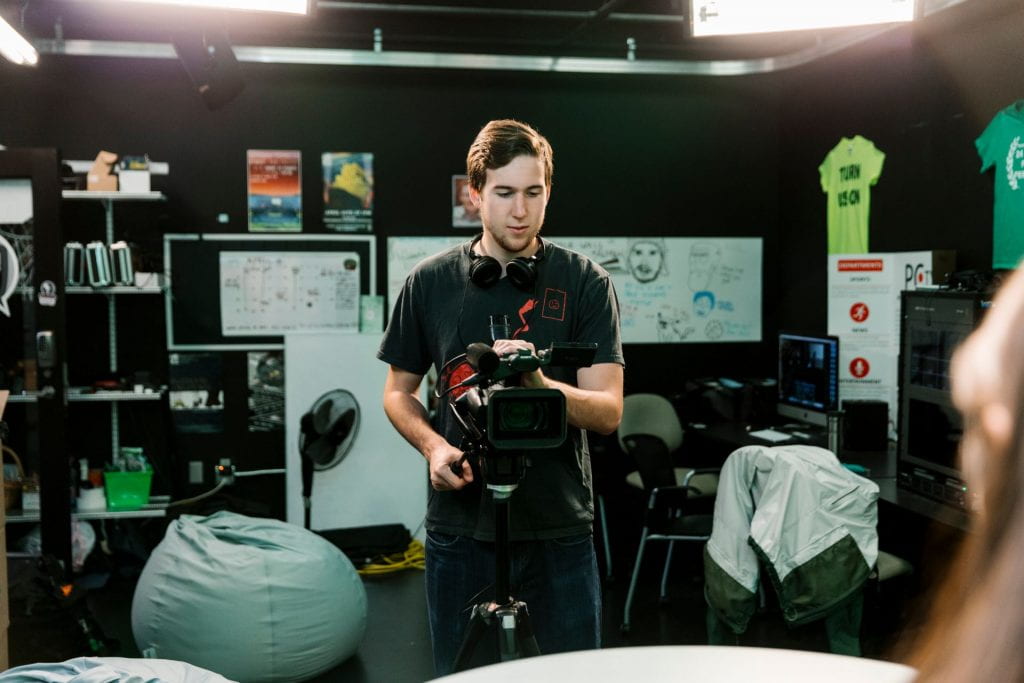Minoring in Communication at Providence College
Communication at Providence College
The Communication program engages students with the history, theory, and practice of communication in an increasingly complex and rapidly changing media and information environment. Coursework introduces students to the development of the field, the technological and cultural advancements of new media, past and present, and the methodologies necessary to interrogate these sites of meaning-making.
Students develop skills in oral, written, and visual communication, learn about interdisciplinary approaches to the study of media artifacts, and gain hands-on experience designing and producing content that communicates effectively to desired audiences. Upper-level students choose from a variety of electives, conduct research on topics in contemporary media culture, and prepare for careers in a wide variety of communication-related industries.
DEGREE PROGRAMS
Major in Communication
The communication major engages students with the history, theory, and practice of communication in an increasingly complex and rapidly changing media and information environment. Coursework introduces students to the development of the field, the technological and cultural advancements of new media, past and present, and the methodologies necessary to interrogate these sites of meaning-making.
Students develop skills in media, written, and visual communication, learn about interdisciplinary approaches to the study of media artifacts, and gain hands-on experience designing and producing content that communicates effectively to desired audiences. Upper-level students choose from a variety of electives, conduct research on topics in contemporary media culture, and prepare for careers in a wide variety of communication-related industries.
Minor in Communication
The communication minor at Providence College introduces students to the principles of mediated and interpersonal communication, with coursework attending to visual, oral, and written expression within a variety of interdisciplinary subject areas.
Students learn the theoretical and historical underpinnings and methodological practices of communication as a field and its relationship with media, culture, politics, and society. This minor prepares graduates for a variety of careers, including in graphic design, commercial art, marketing, advertising, theatre, television, film, radio, arts administration, fundraising, community organizing, project management, public relations, media, and journalism.
Courses in Communications
The Communication Minor consists of seven courses, a total of 21 credits.
COM 100: Intro to Communication
TDF 102: Intro to Oral Communication
ARH 201: Visual Communication
ENG 202: Rhetorical Analysis and Argumentation
Communication Elective – choose from the following:
ENG 375: From Page to Screen
COM 301: Media and Society
HIS/MKT 367: Marketing Campaigns in U.S. History c. 1850
HIS 327: Reading and Writing in Early America
PSC 326: Mass Media and Politics
PSC 382: Politics of Visual Culture
Special Topics available on a rotating basis
COM 452: Internship OR COM 490: Independent Study
480: Communication Capstone
IN THE NEWS
Notable Alumni
David Angell ’69 (1946 –2001)
Emmy Award winning Producer and Creator
Doris Burke ’87, ’92G, ’05Hon.
NBA Analyst, ESPN
Rick Cordella ’99
President, NBC Sports
Peter Farrelly ’79
Academy Award-winning producer, director, and writer
Cayleigh Griffin ’14
Host, AT&T SportsNet Houston
Sean McAdam ’81
Reporter, Boston Sports Journal
Mark Ockerbloom ’85
Anchor, Boston 25 News
John O’Hurley ’76, ’06Hon.
Actor, singer, author, and entrepreneur
Mike Leonard ’70, ’00Hon.
Filmmaker, formerly of NBC Today Show
Edward Scanlon ’55, ’00Hon.
Executive Vice President, NBC (retired)
HOW TO APPLY
A minor in communication is available by application only. Students who have declared a major may apply in their first or second year during the application period, which runs through September and January. Notifications of a decision are sent in October and February. Students who do not receive an initial acceptance may reapply. (Current juniors and seniors are not eligible to apply.)
Requirements
Only students who have declared a major are eligible to declare a minor. Statement of Purpose (500 – 1,000 words): Explain your interest in the communication minor. How does it connect with your major? In what ways will an interdisciplinary minor enhance your learning goals? How will your skills and interests contribute to the cohort of communication minors at Providence College? Sample Creative or Academic Work: Please submit a sample of work that reflects your skills and/or goals in the communication program. Examples might include writing samples, photography, paintings or drawings, video, or digital content.






